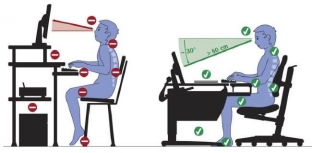Modern lifestyle forces many of us to spend most of our work and free time behind a computer screen. Our work is often associated with the fact that we sit all day, staring at the monitor of a computer, tablet or even a smartphone. And after work, TV shows or favorite computer games make our eyes strain at the screens. Not everyone understands what is the effect of the monitor on our vision and psyche. Today we will talk about which monitor properties are most harmful to our eyesight and what causes CVS.
What monitor influence should I consider when choosing a computer?
Sooner or later, constantly looking at the monitor, our eyes get tired. One of the main problems of the modern screen is its flickering. We do not feel it, but it is there, and it is its action that affects eye fatigue. Most computer screen manufacturers struggle with this negative phenomenon, but it is not completely possible to defeat it, since it is the backlight of the LCD monitor. Based on it, we simply won’t be able to see anything on a computer or tablet.
Especially unsafe is the effect of the blue color emanating from our screen, notes estet-portal.com. Recently, scientists have proven that the blue spectrum of radiation is too bright for our perception and can cause serious damage to vision. It also has a bad effect on the production of melatonin, which is responsible for the correct human biorhythms and healthy sleep. Therefore, do not sleep with the computer screen on.
A very important aspect in choosing a monitor for a family is its brightness. Now it is possible for almost every manufacturer to adjust their profiles for specific purposes of working on a computer. Use this feature. For reading, you can reduce the brightness, for design work, increase, etc.
Computer vision syndrome
Doctors have identified a new CVS (Computer Vision Syndrome) syndrome in people who constantly look at a monitor, which manifests itself in dry and irritable eyes, itching and burning, deterioration of the image sharpness if you look at objects up close.
Scientists, wondering if working at a computer can cause myopia, found out that it manifests itself in people who are only prone to the disease (for example, due to heredity). But CVS syndrome can affect anyone. After all, this is not a disease, but a whole series of accumulating problems that lead to a deterioration in vision in general.
The first reason is that the person begins to blink less. This is due to the fact that we are forced to constantly fix our gaze at one point. In this case, the blinking frequency decreases from 18 per minute to 4 times. This leads to dryness, redness and irritation of the mucous membrane of the eye. Moreover, these symptoms can hardly be called a disease, as they are provoked not by internal problems of the body, but by external factors.
The second cause that provokes CVS is chronic comorbid human diseases that affect the dryness of the mucous membrane (Parkinson's disease, hormonal diseases, arthritis, etc.).
The third reason – this is an incorrect location of a person behind the monitor or an incorrect location of the screen itself in relation to lighting devices, which cause unnecessary glare and reflections, as a result of which excessive strain is caused on the field of view.
What methods can be applied to prevent the harmful effects of the monitor?
First, learn to take breaks from your computer. As a preventive measure, you can shift your gaze to other static objects (if you switched to a tablet or phone, this does not count). You can also train your eye muscles by looking at distant objects that are at least 6 meters away from you (look out the window). Do this every 20 minutes for 20 seconds and your eyes will rest.
Adjust the position of the body in relation to the monitor and its distance from the face. The eyes should be at least 30 centimeters away from the screen, but ideally 50 - 80 cm.

If you wear contact lenses, please replace them with glasses when using your computer. The lenses prevent tear fluid from reaching the mucous membrane of the eye, which can aggravate the situation with vision.
From a mental health point of view, it's best to turn off your monitor 2 hours before going to bed so that the information you're "absorbing" from the screen, managed to "settle down", and you slept calmly and soundly. During this time, the nervous system comes to a state of rest, and the normal production of melatonin begins.
The best prevention would be a dosed presence at the computer, especially after hours. The willful decision to turn off the monitor in time will serve you well more than once.






Add a comment